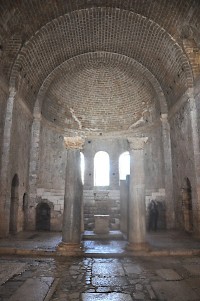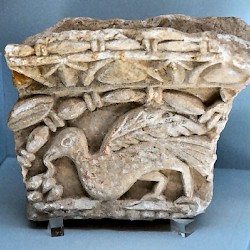Myra, Church of the tomb of St. Nicholas
Q3671440Myra: town in Lycia, modern Demre. It is well-known because it was the residence of Nicholas of Myra, the original saint behind Santa Claus, whose tomb was just outside the ancient city.

In the fourth century, the venerable bishop Nicholas of Myra was one of the most influential leaders in the Christian church. According to legend, he was born in nearby Patara and played a role during the theological discussion on the nature of Christ.
For centuries, pilgrims came to visit his his tomb, which was situated in a church built outside the walls of Myra. The basilica, which had three naves and apses, was rebuilt in the sixth century (by the emperor Justinian) and in the eighth or ninth century. The latest restoration, at the beginning of the twentieth century, was paid by the last czar, Nicholas II.
In 1087, Italian merchants stole the bones and brought them to Bari in southern Italy. (A couple of what are believed to be remaining bones are now in the Archaeological Museum of Antalya.) From Bari, the cult of the saint spread to the western part of Europe. As a consequence, Saint Nicholas, who already was the patron saint of the sailors, now also became the protector of many seafaring nations and towns (e.g., Russia, Amsterdam, and New York).
Because the legend tells that Nicholas once gave gold to three young girls without dowry, it was not unusual to give presents on Saint Nicholas' day, 6 December. In the sixteenth century, the merchants of Amsterdam brought this custom to the New World, to their colony New Amsterdam. When this town had become English in the seventeenth century (it was renamed New York), the inhabitants continued to celebrate Nicholas' saint's day.
In the third quarter of the eighteenth century, this cult, which had lost much of its popularity, became a focus of anti-English sentiments. At least one secret society in New York was called "Sons of Saint Nicholas". In the course of the nineteenth century, this gradually changed into "Santa Claus", whose festival was postponed to 25 December. As Father Christmas, Nicholas has become popular all over the world.







